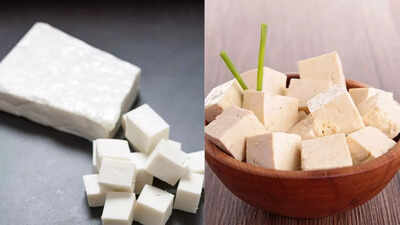Paneer and tofu are popular ingredients in vegetarian cuisine, often appearing similar with their white, soft, and mild texture. However, they differ significantly in origin, nutrition, and culinary use. Paneer is a fresh cheese made from cow or buffalo milk, rich in protein and fat, making it ideal for energy-dense meals. Tofu, made from soybeans, is plant-based, lower in calories, and provides additional nutrients such as iron, calcium, fibre, and beneficial isoflavones. Both are versatile in cooking, absorbing flavours well, but choosing between them depends on dietary preferences, health goals, and whether a vegan or dairy-based option is desired.
Comparing the differences between paneer and tofu: Nutritional comparison, effects on cholesterol , culinary uses
Paneer is a fresh, non-aged cheese made by curdling cow’s or buffalo’s milk with an acid, such as lemon juice or vinegar. Likely originating in India, paneer is also known as Indian cottage cheese. Its mild flavour and firm texture make it versatile for a variety of dishes. Depending on how long it is pressed, paneer can be soft and spongy or firm enough to grill or fry. Unlike most cheeses, it does not melt when heated, which makes it ideal for curries, kebabs, or baked recipes.Tofu, also known as bean curd, is made from soy milk. Like paneer, it is curdled and pressed, resulting in soft, firm, or extra-firm textures. Originating in China, tofu is a staple in many Asian cuisines, including Chinese, Japanese, Korean, and Southeast Asian dishes. It is naturally bland, which allows it to absorb marinades, spices, and sauces exceptionally well, making it a highly versatile ingredient.
Effects of paneer and tofu on cholesterol
Paneer: High in saturated fat and cholesterolPaneer is a dairy product rich in saturated fat and cholesterol, which can raise LDL (bad) cholesterol levels if consumed in excess. Regular high intake may increase the risk of heart disease, liver strain, and other cardiovascular issues. Individuals with pre-existing liver conditions, high cholesterol, or heart problems should monitor portion sizes and consume paneer in moderation.A review published in the National Center for Biotechnology Information notes that while paneer is often recommended for patients with diabetes and coronary heart disease due to its high-quality protein content, it is also high in saturated fat and cholesterol, which could pose risks for individuals with existing cardiovascular conditionsTofu: A cholesterol-friendly alternativeUnlike paneer, tofu is plant-based and naturally free of cholesterol, making it a healthier choice for those looking to manage cholesterol levels. Its lower saturated fat content and beneficial isoflavones may even support heart health and help maintain balanced lipid profiles.
Nutritional benefits of paneer and tofu
Paneer is rich in protein and fat, providing sustained energy and supporting muscle growth. It is also a good source of calcium, essential for strong bones, and contains small amounts of vitamins like vitamin B12, which is important for red blood cell production.Tofu, while lower in calories and fat, provides a balanced nutrient profile with protein, calcium, iron, and fibre. Tofu made with calcium sulfate is particularly high in calcium, which is important for bone health. Additionally, tofu contains isoflavones, plant compounds linked to heart health, bone strength, and hormone regulation. These compounds are absent in paneer.
- Paneer is higher in protein, fat, and calories, which makes it ideal for energy-dense meals.
- Tofu is lower in calories, high in essential minerals, and contains beneficial plant compounds.
Both are complete sources of protein, providing all essential amino acids needed for a healthy diet.
Key differences between paneer and tofu
While paneer and tofu may look alike, their differences extend to origin, ingredients, nutrition, and diet suitability:
- Source: Paneer is made from milk, making it unsuitable for vegan diets. Tofu is plant-based and ideal for vegans.
- Protein and fat content: Paneer is richer in protein and fat per 100g, whereas tofu has lower calories and fat.
- Micronutrients: Tofu is higher in iron, fibre, potassium, and calcium (when made with calcium sulfate), while paneer has moderate calcium and minimal iron.
- Special compounds: Tofu contains isoflavones, which may support cardiovascular health, bone density, and hormone balance.
- Culinary performance: Paneer maintains its shape when cooked and can be fried or grilled easily. Tofu’s texture varies, and softer types may break down in certain dishes.
Bottom line: Both are nutritious, but tofu is better for plant-based diets and additional health benefits, while paneer is ideal for vegetarians seeking a richer protein source.
Culinary uses and tips of paneer and tofu
Cooking with paneer
- Perfect for Indian curries, grilled dishes, and snacks.
- Retains shape during frying or baking.
- Can be used in desserts like rasgulla and sandesh.
Cooking with tofu
- Works well in stir-fries, soups, and stews.
- Absorbs flavours from marinades, sauces, and spices.
- Soft tofu can be blended for smoothies, puddings, or vegan desserts.
- Firm tofu can replace paneer in recipes for a vegan alternative.
Pro Tip: Press tofu to remove excess water before cooking to improve texture and allow it to absorb marinades better.
Similarities between paneer and tofu
Despite their differences, paneer and tofu share several similarities:
- Appearance and texture: Both are white blocks that are firm enough to be cubed.
- Protein source: Both are rich in protein, supporting muscle health and overall nutrition.
- Versatile in cooking: Both absorb flavours well and can be added to curries, stir-fries, soups, or grilled dishes.
- Mild taste: Their subtle flavour allows them to pair with a wide variety of spices and sauces.
Both foods are excellent additions to vegetarian diets, helping meet protein and calcium requirements, and are used in cuisines worldwide for their adaptability.
Choosing between paneer and tofu
Your choice depends on dietary goals:
- For higher protein and richer taste: Choose paneer.
- For low-calorie, vegan-friendly meals with added minerals: Choose tofu.
- For recipe versatility: Both can often be used interchangeably, with firm tofu acting as a suitable replacement for paneer.
Including both paneer and tofu in your diet can diversify your nutrient intake and add exciting variety to meals.Q1: Can tofu replace paneer in recipes?Yes, especially firm or extra-firm tofu, which has a similar texture and absorbs flavours well.Q2: Which is healthier?Tofu is lower in calories and fat and provides iron, fibre, and isoflavones. Paneer has more protein and fat per 100g.Q3: Are paneer and tofu suitable for children?Both are safe and nutritious, but tofu is ideal for plant-based diets, while paneer is suitable for dairy-based vegetarian diets.Disclaimer: This article is for informational purposes only and does not constitute medical advice. Always consult a qualified healthcare professional before making any changes to your health routine or treatment.










